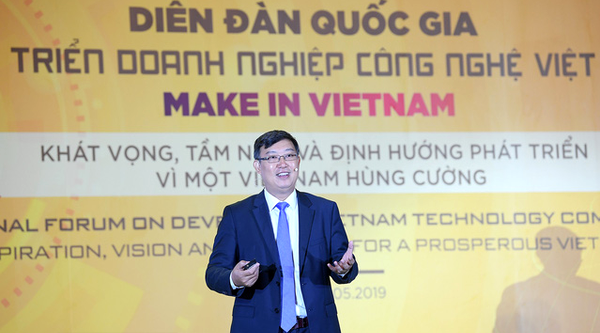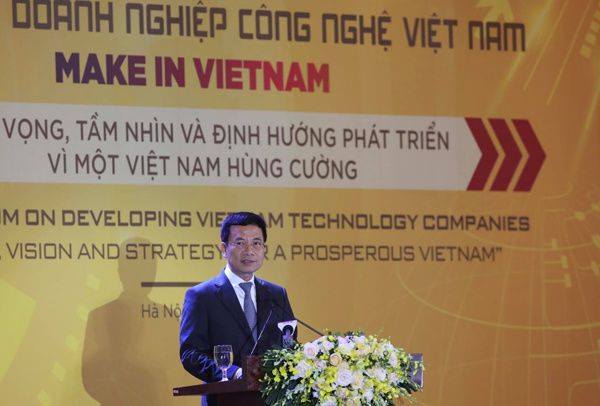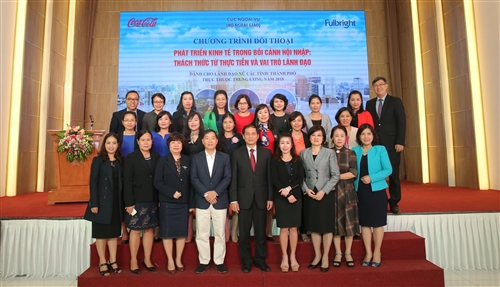Economic expert Nguyen Xuan Thanh, lecturer at Fulbright School of Public Policy and Management attended the National Forum on Developing Vietnam Technology Companies organized by Ministry of Information and Communication on 9 May. This is the first conference on technology company addressing the question how to develop domestic technology firms into an economic breakthrough drivers, enabling Vietnam to escape middle income trap and rise to be among developed countries. Technology companies, in this context, include tech start-ups, solution consulting firms, technology transfers and traditional enterprises with affluent resources wishing to entering promising technology sector.

Opportunities for middle income economies
In his presentation on "Technology companies help Vietnam to escape middle income trap", Nguyen Xuan Thanh asserted that accelerating long-term growth is the key to escape poverty and middle income trap. Over the past 30 years, from 1987 to 2017, Vietnam is the second fastest growing economy in Asia (behind China), achieving an average annual growth rate of 6.7%. Economies successfully breaking the spell of middle income trap all maintained unwaivering high growth rates in a period of over 30 years. In their peaks, Korea (1965-1995) and Singapore (1964-1994) grew annually at 9.5% and 9.2% respectively, China (1981-2011) 10.2%. Considering neighboring countries, Thailand used to grow 7.8% annually during 1965-1995, Malaysia and Indonesia 7.4% from 1967 to 1997. Given these achievements, Vietnam's figure of 6.7% over 30 years from 1987 to 2017 is rather humble.
The roadmap of countries moving from lower-middle to high-middle and subsequently to high income is the structural change from reliance on production factors (natural resources, cheap labor, political and macroeconomic stability, healthcare and basic education) to reliance on efficiency (higher education, open goods-labor-finance markets) and finally to reliance on technology and innovation over a period of 50 years. At the moment, Vietnam is changing from an economy competitive in production factors to competing in efficiency.
Mr. Thanh argued developing countries are not necessarily following the successful formula of predecessors. China and India are more reliant on technology and innovation to develop their domestic technology companies. Following the traditional roadmap, it may take Vietnam over 50 years to reach its targets. However, focusing on technology companies may reduce the time into 20 years. The speaker indicated the rise and prominent role of technology companies in global economy. These are great opportunities for middle income economies when AI and automation help increase productivity by 0.8-1.4/year up until 2030.
Citing most recent statistics, Mr. Thanh concluded that "In the past ten years, technology companies contribute 10-15% to GDP. The average growth of a technology firm is 2.5 times faster than average growth of GDP. Technology companies can help middle income countries to increase their productivity by 0.8-1.4% and significantly accelerate the growth rate of the overall economy"
Furthermore, technology companies are turning into main drivers in fostering growth and determining global competitiveness.
"With a sound system of technology companies, an innovation-based economy can be developed". The expert noted that the rise of technology companies is not the emergence of individual enterprises but the rise of innovation industry. Technology companies and support industries are located in close proximity, united by common values and cooperation towards innovation and creativity.

Mr. Nguyen Xuan Thanh informed an interesting detail that Vietnam technology companies become potential targets of international investors. A survey by Bain&Company (2018) on venture capitals and private equity funds in 2018-2019 confirmed that Singapore is the favourable center for emerging innovation industries in Southeast Asian. On a side note, Indonesia and Vietnam has been eyed by international investors as future destinations (39% showing their interests in Vietnam and 49% in Indonesia).
Four determining factors
The challenges for developing technology companies are national policies on how to attract and establish a cluster industry at one geographical location. The scope of these policies not only impact one narrow field or individual firms but have far-reaching consequences on the viability of a cluster industry.
The presenter from Fulbright University Vietnam believed following factors needed to be carefully considered: human resources, infrastructure for innovation, financial markets and regulatory framework for innovative production; Demand factors (domestic markets fueled by consumer, enterprise and state demand, open foreign markets enabled by new generation free trade agreements); Competitive Landscape (competitive business environments with little and low entry barriers for tech start-ups to research, implement and apply newly introduced technologies on larger sclaes) and Favorable Institutions.
Mr. Xuan Thanh argued that "Human resources is widely discussed factors, in particular English communication skills, ICT skills. It is observed that recently most capable competent employees in English and IT are not formally trained in universities and higher education institutes but are created through training programs by private organizations and start-ups. On the contrary, resources devoted by the government to develop high school and tertiary education are futile".
Educational system need to be liberal and open to allow for students and learners explore and register for desirable courses online or courses offered by education start-ups. These extra-classroom certificates must be recognized by public high schools and universities.
Prevailing obstacles restrict training institutes in a rigid top-down curriculum which fail to capture the real needs of technology companies or deprived learners of opportunities to obtain practical training from external educational institutes. Under the current mechanism, learners have to enrol in external training programs for their employable skills while formal education institutes fail to deliver these skills to learners.
Mr. Xuan Thanh suggested that "Therefore, new education policies should encourage learners' self-training and recognize these training efforts and endow schools with greater discrepancy in deciding their training programs"
Regarding infrastructure development, investment on high-tech parks is a feasible solution promising to support the emergence of innovation cluster industries. However, the government shouls limit their role as infrastructure strategic developer; the management role to build an ecosystem enterprise should be left to private sector.
The Fulbright expert reminded audience of one typical feature of tech startups as persistent negative earnings, except for some large scale technical companies who are successful earning positive income in the beginning.
With this feature in mind, he continued analyzed that it is unlikely for a government's fund financing an enterprise with chronic negative performance? And in reality, tech start-ups received their funds from venture capital and private equity funds."
Hence, in an effort to develop a well-functioning capital markets, the demand for an open policy frameworks for venture capital and private equity funds in Vietnam is obvious. Related to corporate governance, policies must be developed to give enterprises more freedom to facilitate transactions, merger and acquistions among technical firms.
"Vietnam enterprises are original in ideas but they can't grow in scope partly due to insufficient funding. Thus, if firms can't sustain in initial periods to survive in market share war, the technology are unlikely to reach mass consumers and earn positive profits."
Policy hurdles at this moment are those governing enterprises and capital markets forcing many Vietnamese tech start-ups to find their ways to Singapore.
So far, technology companies comprise of 2 categories: start-up technology firms under small scale and big and mature corporations in different fields wishing to enter technology sector. According to Mr. Nguyen Xuan Thanh, the government must design policies with these groups in mind.
He suggested that "For small-scale and risky start-ups, the government shouldn't invest directly but give incentives through tax policies. Currently, enterprises investing in R&D can be granted with tax credits but the fees for application and approval are not worth their . Technical firms have high demands for high-skilled work force. To recruit competent workers, firms must pay highly attractive compensation however with progressive income tax base under current system, firms are demotivated or uncapable employing these leading experts. If recruited, labour contracts may be signed under Singaporean jurisdiction to save payable taxes.
The presenter explained that "technology company create new technologies as a new platform for their operations and this technology will be sold to other enterprises." As a result, framing these new enteprises an old framework is not proper. These firms should be considered a new economic class and the government must introduce new regulatory framework to effectively control these new kinds of business activities.
* An article from Conference on Developing Vietnam Technology Companies
Nguyen Xuan Thanh, Lecturer of Public Policy,
Fulbright School of Public Policy and Management, Fulbright University Vietnam
Related Articles

Sustaining economic growth

Executive Programs in Leadership And Management


